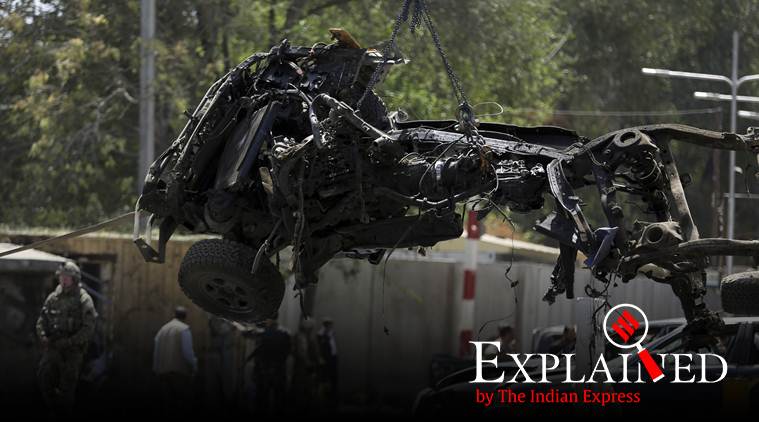- India
- International
Explained: Afghan deal is off. Now what?
US President Donald Trump has said he has ‘called off peace negotiations’ with Taliban. But a resumption of talks cannot be ruled out; nor can a full US withdrawal without a deal. And could India have unexpectedly got a foot in the door?
 Taliban claimed responsibility for this car bomb blast in Kabul on September 5, one of the reasons Trump has cited in calling off the negotiations. (Reuters Photo)
Taliban claimed responsibility for this car bomb blast in Kabul on September 5, one of the reasons Trump has cited in calling off the negotiations. (Reuters Photo)
On September 8, President Donald Trump posted on Twitter that (a) he had been scheduled to meet, within hours and on US soil, the leadership of the Afghan Taliban, and (b) he had “cancelled the meeting and called off peace negotiations” because the Taliban had, “in order to build false leverage”, admitted to a terrorist attack in Kabul in the middle of the “very important peace talks”.
What does this mean?
In effect, Trump upended a nine-month pas de deux in Doha between Zalmay Khalilzad, the US Special Representative for Afghanistan Reconciliation, and the Taliban to close a deal for US troops to leave Afghanistan, in return for a commitment that the Taliban would not allow terrorist activities. A draft agreement was ready by the end of August.
Khalilzad, who had flown to Kabul to brief President Ashraf Ghani — the Taliban had insisted that the Afghan government would not participate in the talks — on the details on August 31, said an agreement had been reached in principle, and Trump would have to greenlight the draft. He made it seem like this was a formality.
Why did Trump back out?
The immediate reason he gave was the September 5 suicide car bombing in central Kabul. The bombing, claimed by the Taliban, killed 12 people including a US serviceman and a Romanian soldier, and left 40 injured. Secretary of State Michael Pompeo offered the same justification.

But few are convinced that this was the real reason.
There had been a steady increase in the number of Taliban attacks from January, when the talks began. Indeed, on September 2, while Khalilzad was in Kabul, the Taliban set off a tractor bomb near a heavily guarded compound for foreigners, killing 16 people and injuring 119 others.
Time magazine said Pompeo, who was to be one of the two signatories on the deal — the other was the Taliban’s chief negotiator, Mullah Baradar — had second thoughts about putting his name to a deal that contained no guarantees from the Taliban, including on a ceasefire, or an agreement to participate in the “intra-Afghan talks”. Trump may have been looking for a way out, and the September 5 bombing may have given him an opening.
READ | Top Afghan leader: ‘Without Pakistan support, Taliban would fade away in 6 months…’
What would have happened at the Camp David meeting (that Trump cancelled)?
Trump’s tweet disclosed for the first time that he had invited the Afghan President and the Taliban for separate talks at Camp David, the US President’s retreat. The New York Times reported that Trump’s plan was to bring them together in a “grand announcement��. However, several US media outlets reported that this secret meeting, scheduled for September 9, had in fact been called off two days before the President posted his tweet.
It appears that the Taliban did not want to attend the meeting before the agreement had been signed. They feared being forced into talks with Ghani, and into accepting a ceasefire.
Ghani, for his part, was preparing to fly to Washington, and knew of the cancellation a day before the tweet. Trump went public with the secret meeting, appearing to cancel it on Twitter, apparently to take charge of the narrative.
The meeting, if it had actually happened, may not have gone down well with Trump’s domestic constituencies.
His hosting the Taliban, who sheltered Osama bin Laden and the al-Qaeda, two days before the anniversary of the September 11 terrorist attacks, would have been terrible optics. Camp David was also where the historic Egypt-Israel accord was reached, which brought for Anwar al-Sadat and Menachem Begin the 1978 Nobel Peace Prize.
 US Special Envoy Zalmay Khalilzad (left) with Afghanistan Chief Executive Abdullah Abdullah in Kabul. (Source: Afghanistan Chief Executive office via Reuters)
US Special Envoy Zalmay Khalilzad (left) with Afghanistan Chief Executive Abdullah Abdullah in Kabul. (Source: Afghanistan Chief Executive office via Reuters)
So are the talks with the Taliban dead?
It is difficult to say this with certainty. Trump famously resumed his talks with North Korea’s Kim Jong-un after cancelling them. The Khalilzad camp hopes there will be a resumption in a month or two. But if that happens, US negotiators would have to get more out of the Taliban than the draft agreement seems to contain. If the talks are finished, so is Khalilzad, who saw the Afghan deal as a stepping stone to a bigger profile in a possible Trump 2.0.
Pakistan, which played a proactive role to bring the Taliban to the table, and was praised by Trump for it, too has expressed hope for “optimised engagement following earliest resumption of talks”.
But then again, it is also possible that Trump may decide to withdraw US troops without an agreement. The Washington Post reported this was the view that National Security Advisor John Bolton, who was opposed to a deal with the Taliban, held — however, in an iteration of the US President’s remarkable unpredictability, Bolton himself was fired on Tuesday.
How have the Taliban reacted?
They issued an angry statement on the letterhead of the Islamic Emirate, simultaneously claiming a commitment to peace and warning of more violence. “…We had selected 23 September as the first day for the intra-Afghan talks after the agreement had been signed and announced… Now, the announcement by the President of the United States of an end to negotiations with the Islamic Emirate will harm America more than anyone else; it will harm its credibility, and further expose its anti-peace stance to the world; it would [result in] an increase in financial damage and casualties to its forces; it would demonstrate its political interactions as untrustworthy…” (Translated statement from the Afghan Analysts Network).
What has the Afghan government said?
It cannot be displeased. It was excluded from the entire process on the say-so of the Taliban, and feared the commitments that Khalilzad was making to the Taliban. Afghans who had invested in the building of a democratic country, feared that the US withdrawal would be followed by a repeat of 1996 when the Taliban simply outgunned others to return to power. They also feared this was Pakistan’s plan to take control of Afghanistan through a proxy.
“…[T]he government considers the Taliban’s obstinacy to increase violence against Afghans as the main obstacle to the ongoing peace negotiations. We have consistently stressed that genuine peace is possible when the Taliban stop the killing of Afghans, embrace an inclusive ceasefire, and enter into direct negotiations with the Afghan government. The government of Afghanistan reiterates its stance on holding the presidential elections on September 28…,” the government said in a statement.
Before the deal fell through, Amrullah Saleh, who is a candidate for vice-president as a running mate of President Ghani, had been outspoken in his criticism of the deal. He had told The Indian Express in an interview: “[The Americans] are breaking norms by trying to sign a deal with a terrorist entity, a non-state malign actor and an insurgent group. We don’t know how they will give it legal justification.”
India had no role in the Afghan talks. Has it now got a chance to get back in the Great Game?
India has not reacted yet to the failure of the Afghan talks. But it was unhappy at Pakistan’s role in the process, and the possibility that the Taliban would return to power. India had no official contact with the Taliban. The break in the talks could be the opening that New Delhi was looking for to make contact with at least those sections of the Taliban that are not under the thumb of Pakistan.
More Explained
EXPRESS OPINION
Apr 25: Latest News
- 01
- 02
- 03
- 04
- 05










































